The Entertainment
The Entertainment takes place at the end of Act II and is a fitting warm-up to Act III (No Act III spoilers will be mentioned here). In many ways, The Entertainment is one of the purest forms Kentucky Route Zero takes -- perspective has dramatically changed and the player is situated in first person within the play. As you look around you might immediately think you are in the audience, but the gaze of the faceless bartender, Harry, frequently engages the player. The uncredited bar-fly is surely referring to the player here.
Whilst the overt theme of this play is debt, there is an underlying commentary on some recurring themes from the game as a whole; drama, poetry, stage and set design, class and more. All of these serve to reinforce Kentucky Route Zero as an 'assemblage' or 'rhizome', in a Deleuzian sense. The view of Kentucky Route Zero I would argue for is that each act and intermission can be seen as an assemblage within the rhizome, or haecceity that is "Kentucky Route Zero". And we need not stop there - in many ways the individual character of KRZ as a type of haecceity is possible thanks to it inviting the player to make choices that tint and colour the world - however The Entertainment offers no such choice, so we can park that discussion for another day. As such, we can go on to untangle and re-entangle some of the ways it is representative of an assemblage, and the challenges it can provide to those engaging with it.
'A Reckoning & A Bar Fly'
When exploring the surroundings we uncover reviews and writers notes explaining the history of 'The Entertainment'. We are told that originally these were two separate plays; 'A Reckoning' and 'A Bar Fly', but the director (Joseph Wheatree, the gas station poet from Equus Oils in Act I) has adapted them to be played simultaneously on top of each other. Immediately, we can think of films such as La femme du Ganges - an experimental piece where the audio track and image are of two entirely separate stories, but once merged together produce an enthralling new piece (notably - it could be argued as "greater than the sum of their parts" - just as we might over-simplify the concept of an assemblage).
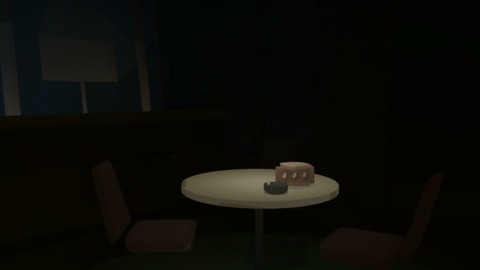
Through the writer's notes we also have it revealed that Joseph never wrote explicit descriptions of sets - as our first encounter with Joseph in Act I where the password to his PC is "a poem that really sums it all up" - we are told that his set descriptions were all written in poems, and that it caused the director a lot of trouble when trying to design the set. Through this, The Entertainment as an assemblage gains its next dimension - and why we might push to describe it as a haecceity in some regards - the design of the set itself is an interpretation of a poem; to outline the dimensions we might call it Art (poem) informing art (set design) complementing art (two simultaneous scripts) to be interpreted (by the viewer). The reviews reveal and forewarn us that for many it may not be successful - many describe it as a dull play with only a few rewarding performances!
So what is to be taken from this? Without examining any of the content of The Entertainment, in form alone we can see it is challenging the player. The challenge is here to not only "be creative", but to absorb and experiment and 'transversally' connect distinct elements to create a new assemblage - a new whole. When looking at the content of the play we can draw more transversal connections, but even when reviewing the play (or KRZ as a whole) it is an open invitation to do so in a transversal way connecting elements from our own lives and experiences to it -- it is not just to be "enjoyed" as an object -- we are implicated within this assemblage/haecceity itself.
Debt & The Morally Right Thing
So with the structure of the play out of the way - what is there to draw from the content? Two overt themes throughout the play are those of Debt and "The Morally Right Thing" (hereon "the Good"), but in the background (transversally?) connecting the two is the question of Truth and how much it matters. With our three main 'sets' of characters (Harry/Bartender, Slade Family, Evelyn/Patron) the role of truth can be underpinned (in broad strokes) in the following;
- Where Harry went on holiday
- Whether Evelyn's lover is cheating on her
- Whether Rosa Slade will get a promotion
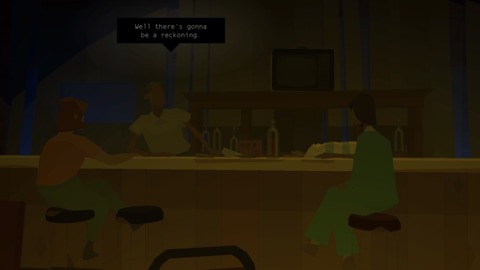
In the first, questions on whether Harry went to a pool or a beach is drawn, and ultimately concluded to be largely meaningless (until it is revealed he didn't go anywhere and stayed home depressed). In the second, whether Evelyn's lover is actually cheating on her is ancillary to the fact that she is just miserable at the financial situation of the family - it almost seems like she wants him to be cheating on her in places, the truth of the matter hardly mattering. Finally, there is the interpretation of Rosa being told "maybe someday" she might become "management material" - as the dialogue unfolds it becomes clear she will never be a manager but the family continues to celebrate. All indications are - the truth doesn't really matter at all, and is entirely less important than the material conditions each character is restricted by.
When looking at said material conditions, the common theme running between all parties is debt; we start with Rosa. Financial difficulties leave her partner selling hammers whilst she racks up a bar tab. We meet the Slade family who are perpetually in debt and relying on their daughter (who works for a pawn shop offering secured loans, primarily it is implied to the working class black community) keeping them afloat, and finally the bartender who is in debt to the distillery supplying his whiskey. The metaphor is not lost here - Harry is only serving Hard Times whiskey, a distillery in which they "put debt in the whiskey itself".
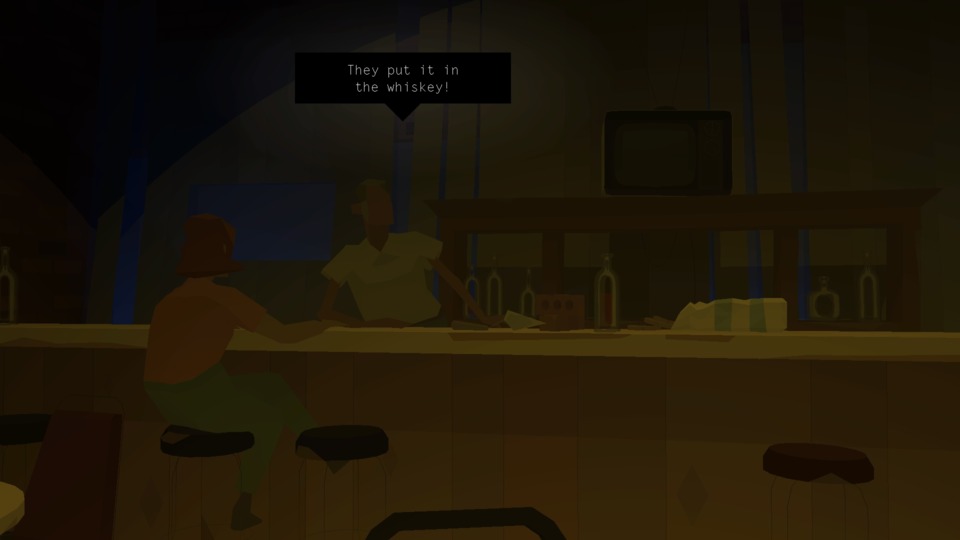
In parallel to the slow revealing of debt, we see the struggle with the Good each character is going through to keep them there. Whilst Evenlyn is not discussed directly, her mourning and family worries reveal her sensitivity around the Good. Within the Slade family however, we see a deeper look at it. Pearl Slade's proposal that leaving her parents in debt to the bar will teach them a lesson rings ironically of a parental generation - a generation of "tough love". Her family on the other hand hold on to traditional family values - that families look out for each other and that Pearl would not let them sink into debt - and above all the hope and joy tied to Rosa's potential promotion deserves to celebrated.
Harry's battle with the Good sees the play end, and ultimately one of the key messages that will permeate many of Kentucky Route Zero's best moments -- despite being a business owner Harry's humanity led to him giving away too many free drinks to the patrons. The hope that was tied to the Good from all these characters collapses into tragedy as he reveals he was forced to sell their debt to the distillery, and that "A Reckoning" was coming for them. With this we hear a loud buzzing and the skeleton worker from Hard Times is revealed into curtain close.
A deeper discussion of religion in Kentucky Route Zero would let us examine this more, and the text is rife with it - from abandoned churches in Act I and the Bureau in Act II - but the frequent references to Christianity within The Entertainment and the fact that debt collection is referred to as 'A Reckoning' can be no coincidence.
The Entertainer wants us to see financial capitalism for what it is - a reckoning on the working class called in by those skeletons from HQ.
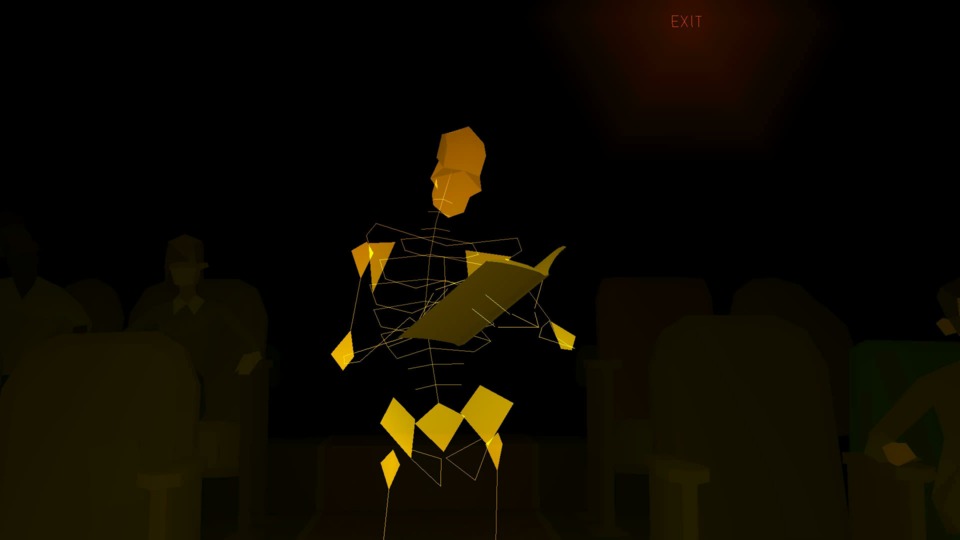
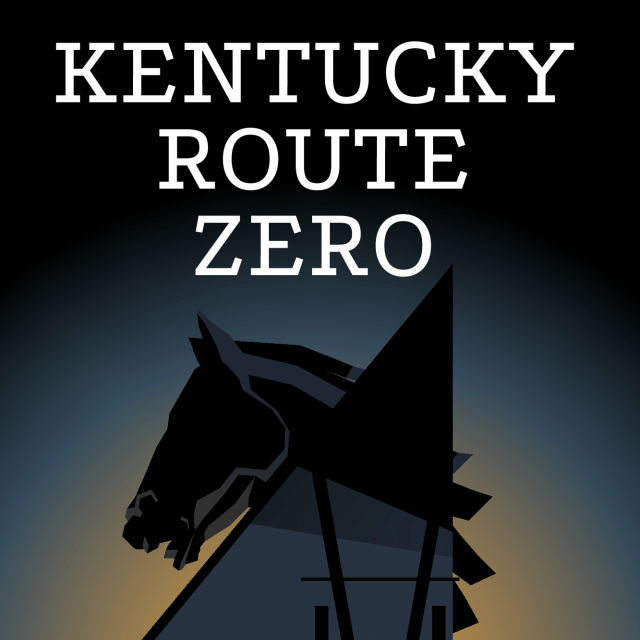
Log in to comment